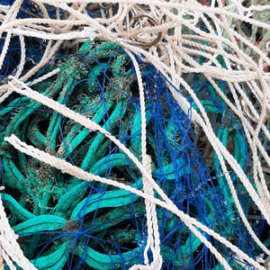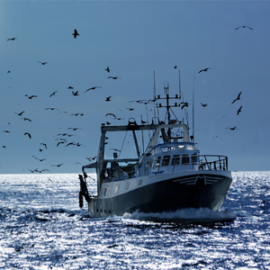Deliverables
Find here the deliverables produced by the INdIGO project in the different work packages.
WORK PACKAGE 1 - Situational analysis of pollution generated by the use of plastics in the fishing and aquaculture industry.
Inventory of plastics used in fishing and aquaculture industry
The objective of this study is to assess the current situation regarding the pollution generated by the use of plastics in the fishing industry, in order to propose a relevant alternative solution adapted to the needs of the end-users.
Fish & Click : Website and mobile application and mapping lost fishing gears
Fish & Click is programme to collect data on abandoned, lost and discarded fishing gear. Walkers, divers, boaters and fishermen are invited to share their observations, whether at sea or on the shore.
Specification for the new gears
The specifications of the two prototypes establish the main technical characteristics. The specifications serve as a basis for the development of biodegradable formulations.

Biodegradability and sustainable fisheries: The case for static gear in the UK Channel fishery

Good Practice Guide
Good practices on the management of end-of-life fishing gear for fishers, harbour and the general public. Have a look at the materials produced by the University of Plymouth and by Smel.
Market analysis
The purpose of the market analysis is to understand the “potential market” for biodegradable fishing gear (BFG) in the programme area. The potential market is disaggregated to three levels – the total addressable market, the serviceable available market and the serviceable obtainable market.
The Economic Impacts of ALDFG and Ghost Fishing
This report provide a resource base to support fishermen in their decision to invest in Biodegradable Fishing Gear (BFG) to mitigate the ghost fishing impact caused by Abandoned, Lost, or otherwise Discarded Fishing Gear (ALDFG).

The economic impacts of introducing biodegradable fishing gear as a ghost fishing mitigation in the English Channel static gear fishery

WORK PACKAGE 2 - New fishing gear development
What is biodegradable fishing gear in the marine environment?
The two selected formulations
In the framework of the INdIGO project, two biodegradable materials were produced, one for a fishing net, one for a mussel aquaculture net.

The role of the consumer in biodegradable fishing gear development in the Channel fishery
This report address the role of the consumer in the developmental phase of biodegradable fishing gear and assess their willingness to pay higher prices for fish caught with biodegradable fishing gear in the Channel fishery.
Semi-finished products developed at laboratory scale
This technical report describes the different processing steps to produce the formulations for the monofilament and the multifilament. It also details the various tests carried out on pellets of compounds and injected test bars, in order to characterize the materials and to improve formulations.

The two prototypes nets
The aim of this activity is to design and manufacture prototypes of biodegradable nets on an industrial scale using the semi-finished products developed in the previous activity. With the aim of replacing some of the nets currently used for aquaculture (made of polyester and polypropylene) and fishing (polyamide), the use of biodegradable nets will make it possible to reduce the impact of ghost fishing in the long term.
WORK PACKAGE 3 - Study of marine ageing and environmental impact of the new material
Technical Report on the study of ageing of the new fishing gear
This report presents the several ageing studies of the materials developed (monofilaments and multifilaments) that have been carried out to analyse their behaviour when exposed to extreme conditions (UV, seawater, etc.) over relatively long periods.

Report on the results of the biodegradation and ecotoxicity tests
This report contains the results of respirometric biodegradation tests and ecotoxicity tests carried out on the formulations produced as part of INdIGO.

Life Cycle Assessment of recycled fishing gear
A comprehensive evaluation of current recycling and waste disposal of the marine litter including the data on the rate of recycling and method was processed using Life Cycle Assessment approach.

WORK PACKAGE 4 - Psycho-ergonomic approach
Fishermen’s survey: the main results
Study of the acceptability of biodegradable fishing gear
The aim of this document is to present the method used for the construction and implementation of the pilot questionnaire for WP1 and WP4. This document was used as a methodology for the pre-questionnaire.

Study of the acceptability of biodegradable fishing gear: results and recommandation
The objective of this study is to identify the barriers and levers to the acceptability of a new biodegradable fishing gear. The results should be used to make recommendations for the design of the biodegradable fishing gear and to implement an action plan to accompany the transition towards sustainable fishing practices.
Study of the appropriation of the prototype
This study focuses on the fishing activities of fishermen working on gillnet boats. The aim of the study is to identify the obstacles and levers to the integration of a new fishing net into the fishing system. This study was carried out in addition to the modelling of the marine fishing activity system and the analysis of contradictions.







